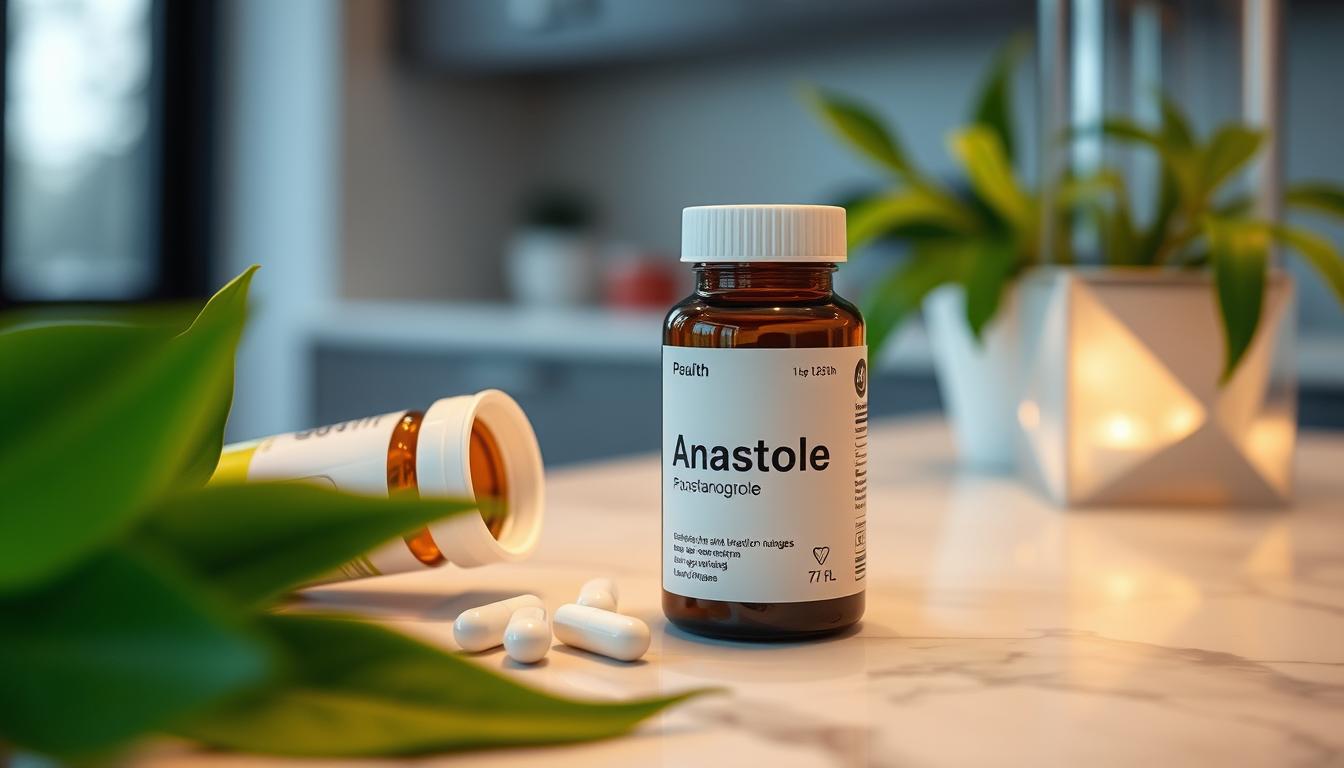It’s key to know the risks of mixing dicyclomine with alcohol. Dicyclomine helps with irritable bowel syndrome (IBS) and other stomach issues. But mixing it with alcohol can be risky. We’ll look into the dangers and how to use them safely.
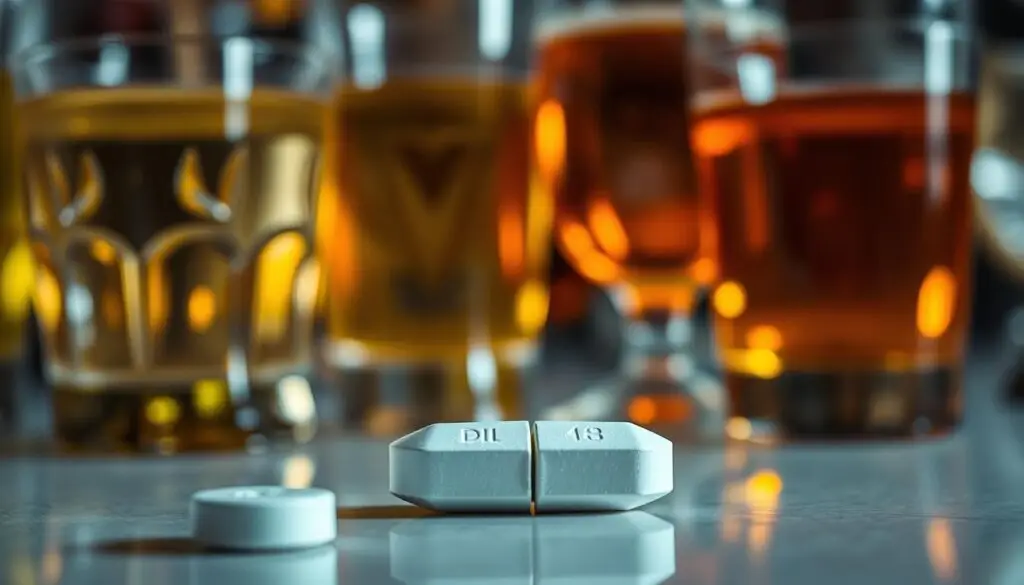
Key Takeaways
- Dicyclomine is a medication used to treat various gastrointestinal conditions, including irritable bowel syndrome (IBS).
- Combining dicyclomine with alcohol can increase the risk of drowsiness, impaired mental function, and other potentially dangerous side effects.
- It’s important to avoid alcohol while taking dicyclomine and to consult with a healthcare professional before using these implications together.
- Dicyclomine may have an impact on liver health, so it’s crucial to monitor any potential side effects.
- Responsible use of dicyclomine and avoiding certain substances can help ensure the medication is effective and safe for the user.
Read More: How Long Does Excedrin Stay In Your System?
Understanding Dicyclomine
Dicyclomine is a medicine for cranky bowel syndrome (IBS) and other stomach problems. It relaxes the muscles in your stomach. This helps with pain, cramps, and diarrhea.
What is Dicyclomine?
Dicyclomine, also known as Bentyl, is an antispasmodic drug. It’s in a group called anticholinergics. These drugs block acetylcholine, a chemical that makes muscles contract in your stomach.
How Does Dicyclomine Work?
Dicyclomine relaxes the muscles in your stomach. This reduces spasms and contractions. It helps with pain, cramps, and diarrhea, giving relief to those with these issues.
| Mechanism of Action | Effect on the Body |
|---|---|
| Blocks acetylcholine receptors | Relaxes smooth muscles in the digestive tract |
| Inhibits muscarinic receptors | Reduces spasms and contractions |
| Decreases gastrointestinal motility | Alleviates symptoms like abdominal pain and diarrhea |
Knowing how dicyclomine works is key. This is especially true when you’re thinking about drinking alcohol with it.
Dicyclomine and Alcohol: A Risky Combination
When you take dicyclomine, a common drug for stomach issues, watch out for alcohol. Mixing dicyclomine with alcohol is risky. Both can affect your brain a lot.
Alcohol slows down your brain, making you sleepy, less sharp, and less able to think. Dicyclomine can also make you sleepy and less sharp. Together, they can make things worse.
Using dicyclomine and alcohol together can lead to bad effects. These include:
- More sleepiness and tiredness
- Harder to focus and make choices
- Higher chance of accidents and injuries
It’s best to not drink alcohol while taking dicyclomine. If you do drink, talk to your doctor first. Watch how your body reacts to stay safe.
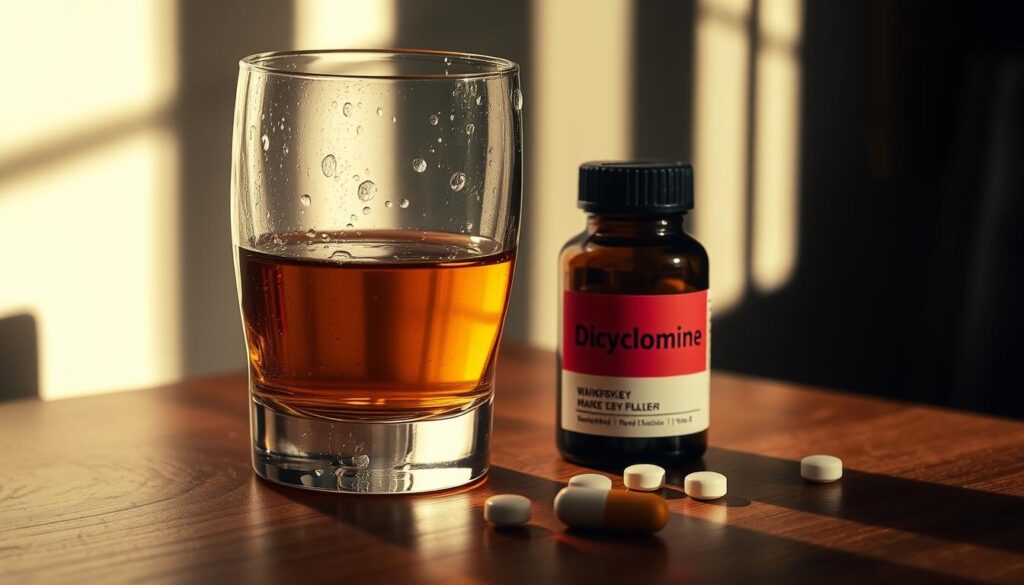
Being informed and making smart choices is key to staying healthy. Knowing the risks of mixing dicyclomine and alcohol helps you protect yourself.
Potential Side Effects of Mixing Dicyclomine and Alcohol
When you take dicyclomine, remember how it mixes with alcohol. This mix can cause serious side effects. These can hurt your safety and health. The main worries are feeling very sleepy and not thinking clearly.
Increased Risk of Drowsiness
Dicyclomine can make you feel very sleepy. Drinking alcohol with it makes you even sleepier. This can make it hard to stay awake and focused.
Being too sleepy is not safe. It’s bad for driving or using big machines.
Impaired Cognitive Function
Using dicyclomine and alcohol together can mess with your thinking. You might not think as clearly or make good choices. This can lead to accidents or dangerous situations.
It’s important to know how alcohol can affect dicyclomine. Stay away from these two when you need to focus and be careful.
| Potential Side Effect | Description |
|---|---|
| Increased Drowsiness | The mix of dicyclomine and alcohol makes you very sleepy. This is not safe for tasks that need you to be alert. |
| Impaired Cognitive Function | Using dicyclomine and alcohol together can make you think less clearly. This can lead to accidents. |
Remember the risks of mixing dicyclomine and alcohol. Always put your safety first. Try not to mix these two whenever you can.
Dicyclomine and Alcohol: Interactions to Watch Out For
It’s important to know how dicyclomine and alcohol interact. This knowledge helps you use them safely. Let’s explore how they affect each other.
Dicyclomine and Alcohol Interactions Explained
Drinking alcohol can make dicyclomine’s side effects worse. Also, dicyclomine might change how your body handles alcohol. Both can make you feel very sleepy and less sharp.
- Increased risk of drowsiness and sedation when combining dicyclomine and alcohol
- Potential for dicyclomine to affect the way your body processes alcohol
- Amplified side effects from the combined use of dicyclomine and alcohol
It’s best to not drink alcohol while taking dicyclomine. Talk to your doctor if you’re worried about these interactions.
“Knowing the potential interactions between dicyclomine and alcohol is crucial for making informed decisions about your health and safety.”
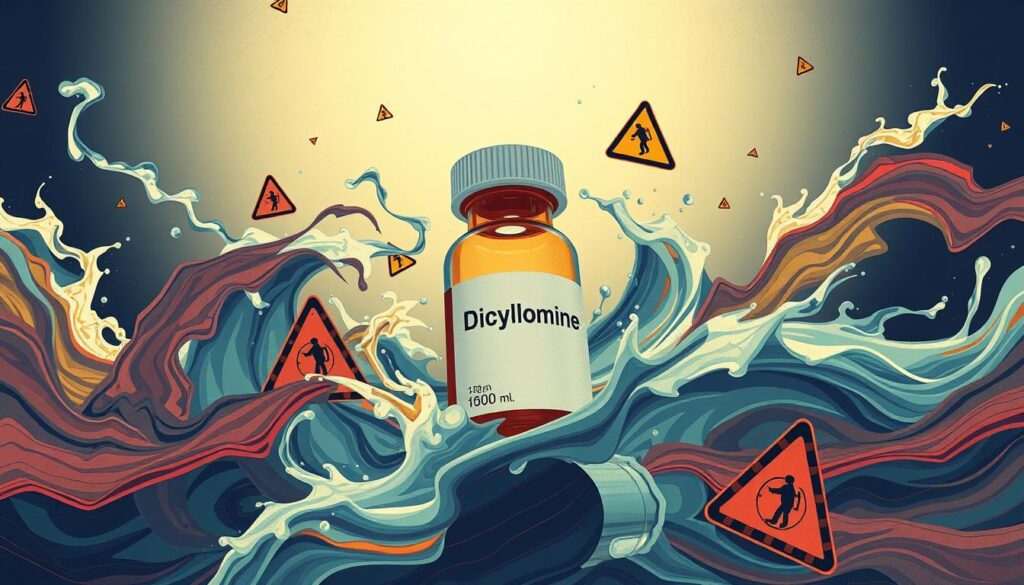
Being careful with dicyclomine and alcohol is important. This way, you can stay safe and healthy.
Dicyclomine Side Effects
Dicyclomine can cause many side effects, even without alcohol. It’s important to know these side effects before mixing it with alcohol. Here are some common side effects to watch out for.
Dry Mouth
Dicyclomine often leads to dry mouth. It makes less saliva, causing mouth and throat dryness.
Dizziness and Blurred Vision
Some people get dizzy or see things blurry when taking dicyclomine. It affects the nervous system, causing these issues.
Constipation
Dicyclomine can also make it hard to go to the bathroom. It slows down digestion, making bowel movements tough.
“Considering the potential dicyclomine side effects is crucial when evaluating the risks of combining it with alcohol.”
Knowing these side effects helps you decide if dicyclomine is safe with alcohol. Always talk to your doctor about your concerns. They can help you use the medication safely.
Is Dicyclomine Hard on the Liver?
Many people worry about dicyclomine’s effect on the liver. Dicyclomine is usually safe, but it can sometimes harm the liver. It’s key to know how dicyclomine and alcohol can affect the liver together.
Understanding the Impact on Liver Health
The liver helps get rid of medicines from our body. Dicyclomine is processed by the liver. Most of the time, it doesn’t harm the liver. But, in some cases, it can cause liver problems.
Drinking alcohol with dicyclomine can make liver issues worse. It’s important to watch your liver health closely when using these together.
| Potential Liver-Related Side Effects of Dicyclomine | Frequency |
|---|---|
| Elevated liver enzymes | Rare |
| Acute liver failure | Very rare |
| Liver damage when combined with alcohol | Increased risk |
If dicyclomine worries you about your liver, talk to your doctor. They can check your liver with blood tests. They’ll help you use dicyclomine safely, even if you drink alcohol.

Dicyclomine and Alcohol
Dicyclomine is a medicine for stomach problems. It’s important to be careful when drinking alcohol with it. Mixing dicyclomine and alcohol can cause serious side effects.
Drinking alcohol with dicyclomine can make you very sleepy. It can also make it hard to think clearly. You might feel dizzy, confused, and have trouble focusing.
Potential Side Effects of Mixing Dicyclomine and Alcohol
- Increased risk of drowsiness
- Impaired cognitive function
- Dizziness and disorientation
- Difficulty concentrating
The side effects can be different for everyone. How much dicyclomine you take and how much alcohol you drink matters. If you’re taking dicyclomine for anxiety, try not to drink alcohol. This can help avoid bad reactions.
What to Avoid with Dicyclomine?
Don’t drink alcohol or take other medicines with dicyclomine. Some medicines, like antidepressants and muscle relaxants, can make side effects worse.
Talk to your doctor about your medicines. They can help you use dicyclomine safely. They’ll tell you about any medicines to avoid.
“Dicyclomine can be an effective treatment for various gastrointestinal issues, but it’s crucial to be mindful of potential interactions, especially with alcohol and other medications.”
Using dicyclomine wisely is key to staying healthy. Listen to your doctor and follow their advice. This way, you can use the medicine safely and effectively.
| Substance | Potential Interaction with Dicyclomine |
|---|---|
| Alcohol | Increased risk of drowsiness, impaired cognitive function, and other adverse effects |
| Antidepressants | Possible amplification of side effects, such as dry mouth, constipation, and blurred vision |
| Antihistamines | Potential for additive anticholinergic effects, leading to more severe side effects |
| Muscle Relaxants | Increased risk of sedation and impaired coordination |
What to Avoid While Taking Dicyclomine
When you take dicyclomine, watch what you drink and eat. Alcohol is a big no-no. But, there are other things you should avoid too.
Substances to Avoid
Don’t mix dicyclomine with certain medicines or fun drugs. Here’s what to skip:
- Antidepressants: They can make dicyclomine side effects worse, like dry mouth and constipation.
- Antihistamines: They can make you very sleepy and affect your thinking. This can be dangerous.
- Recreational drugs: Mixing dicyclomine with drugs like marijuana or opioids is very risky. It can cause serious problems.
Talk to your doctor about all your medicines and supplements before starting dicyclomine. They can help you avoid bad interactions and find the best treatment.
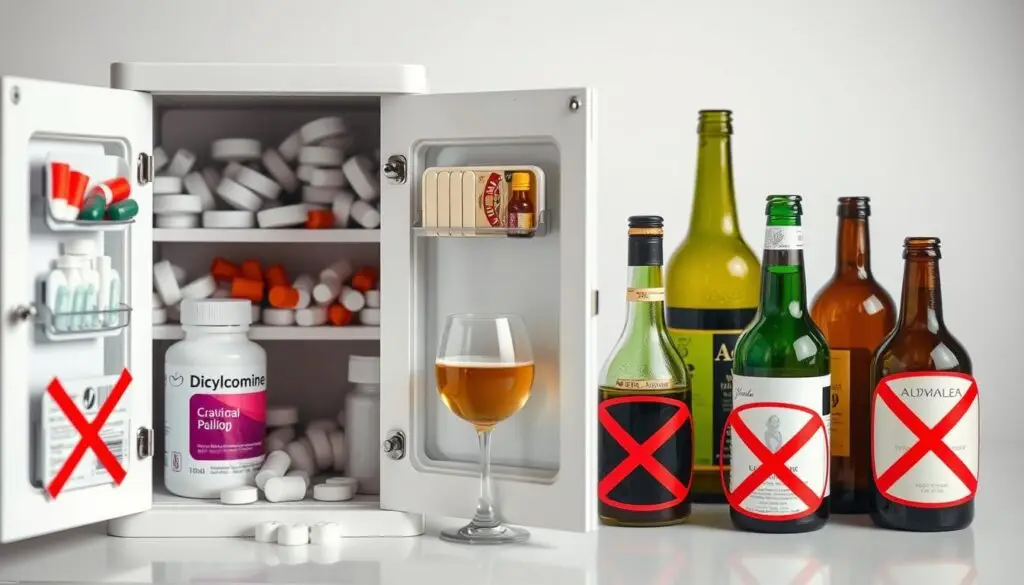
Being careful about what you drink and eat with dicyclomine helps avoid problems. It makes sure your treatment works well.
Dicyclomine: Anxiety Relief or Not?
Dicyclomine is sometimes used to help with anxiety. But, there’s not much proof it works well. Always talk to a doctor before trying it, especially with alcohol.
Dicyclomine is mainly for stomach problems like IBS. Using it for anxiety is not its main purpose. This means we don’t know as much about its safety for anxiety.
Some studies say dicyclomine might help with anxiety a little. But, the evidence is weak. We don’t really know how it works for anxiety.
Dicyclomine might help some people feel less anxious. But, it’s not a sure thing. There are better ways to manage anxiety, like therapy or other medicines.
If you’re thinking about dicyclomine for anxiety, talk to your doctor. They can help you understand the risks, especially with alcohol.
| Dicyclomine Use | Potential Benefits | Potential Risks |
|---|---|---|
| Approved for IBS and other gastrointestinal conditions | May provide mild anxiety relief in some individuals | Limited evidence for efficacy in treating anxiety; potential for side effects and interactions with alcohol |
In short, dicyclomine might help with anxiety a bit. But, it’s not well-studied for this use. Always talk to a doctor to find the best way to manage anxiety, considering all risks and benefits.
Safe Use of Dicyclomine
Using dicyclomine safely is very important. Always follow what your doctor tells you. This means taking the right amount and watching for side effects.
Tips for Responsible Use
To use dicyclomine safely, here are some tips:
- Take dicyclomine just as your doctor says. Don’t take more than they tell you to.
- Stay away from alcohol and other medicines that might mix badly with dicyclomine.
- Watch how your body reacts to the medicine. Tell your doctor if you notice anything strange.
- Be careful when driving or using machines. Dicyclomine might make you feel sleepy or not sharp.
- Keep dicyclomine where kids can’t get it. Throw away any leftover medicine safely.
By following these tips, you can use dicyclomine safely. This helps you get the most benefits without risks. Always put your health first when dealing with your medical needs.
“Taking dicyclomine responsibly is crucial for your safety and well-being. Follow your doctor’s instructions and be vigilant about potential side effects.”
Conclusion
Mixing dicyclomine and alcohol can be risky. It’s important to know the side effects and how it affects your liver. Always listen to your doctor and use these substances carefully.
Dicyclomine helps with some digestive problems. However, adding alcohol can cause problems like feeling very sleepy or having trouble thinking clearly. Knowing these risks helps keep you safe.
Talk to your doctor about any worries you have. They can give you advice that fits your situation. This way, you can take care of your health and stay safe.
FAQ
What is dicyclomine?
Dicyclomine is a medicine for irritable bowel syndrome (IBS) and other stomach problems. It relaxes the stomach muscles. This helps with pain, cramps, and diarrhea.
How does dicyclomine work?
Dicyclomine relaxes stomach muscles. This helps with IBS and other stomach issues. It’s important to know how it works with alcohol.
Can I take dicyclomine after drinking alcohol?
No, it’s not safe to take dicyclomine after drinking alcohol. Alcohol and dicyclomine can make you very sleepy and slow. This is dangerous.
What are the potential side effects of mixing dicyclomine and alcohol?
Mixing dicyclomine and alcohol can make side effects worse. You might feel very sleepy and not think clearly. This is risky, especially for driving or using machines.
How does alcohol affect dicyclomine?
Alcohol can make dicyclomine work stronger. This can make side effects worse. Dicyclomine might also change how alcohol works in your body. It’s important to know this.
Is dicyclomine hard on the liver?
Dicyclomine is usually safe, but it can rarely harm the liver. Drinking alcohol with dicyclomine increases liver risks. Always watch your liver health.
What should I avoid while taking dicyclomine?
Don’t take dicyclomine with alcohol or other medicines like antidepressants. Also, avoid recreational drugs. Staying away from these can keep you safe.
Can dicyclomine be used for anxiety?
Some people use dicyclomine for anxiety, but it’s not proven to work well. Always talk to a doctor before trying it for anxiety, especially with alcohol.

